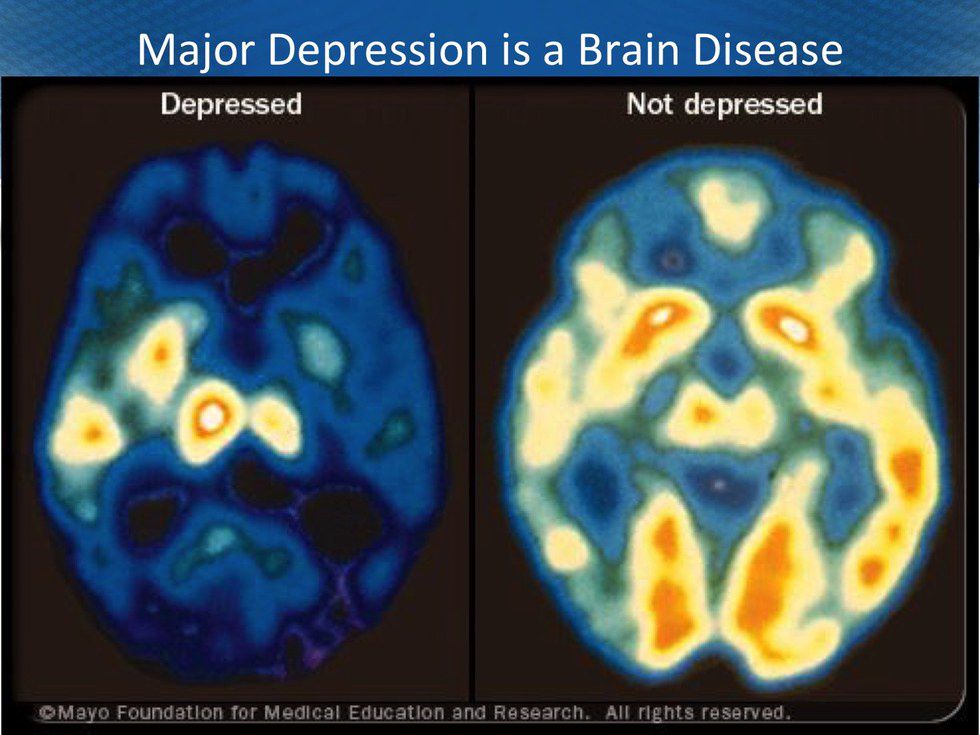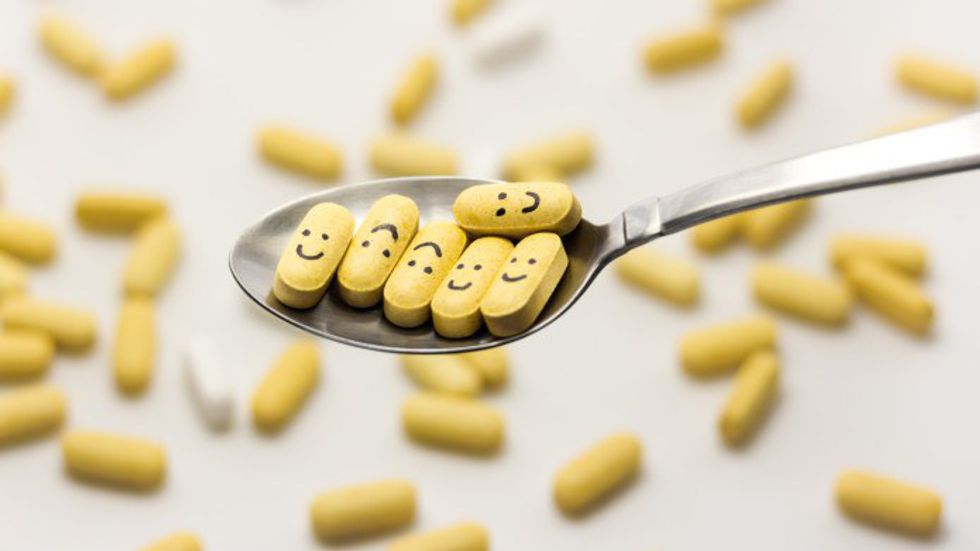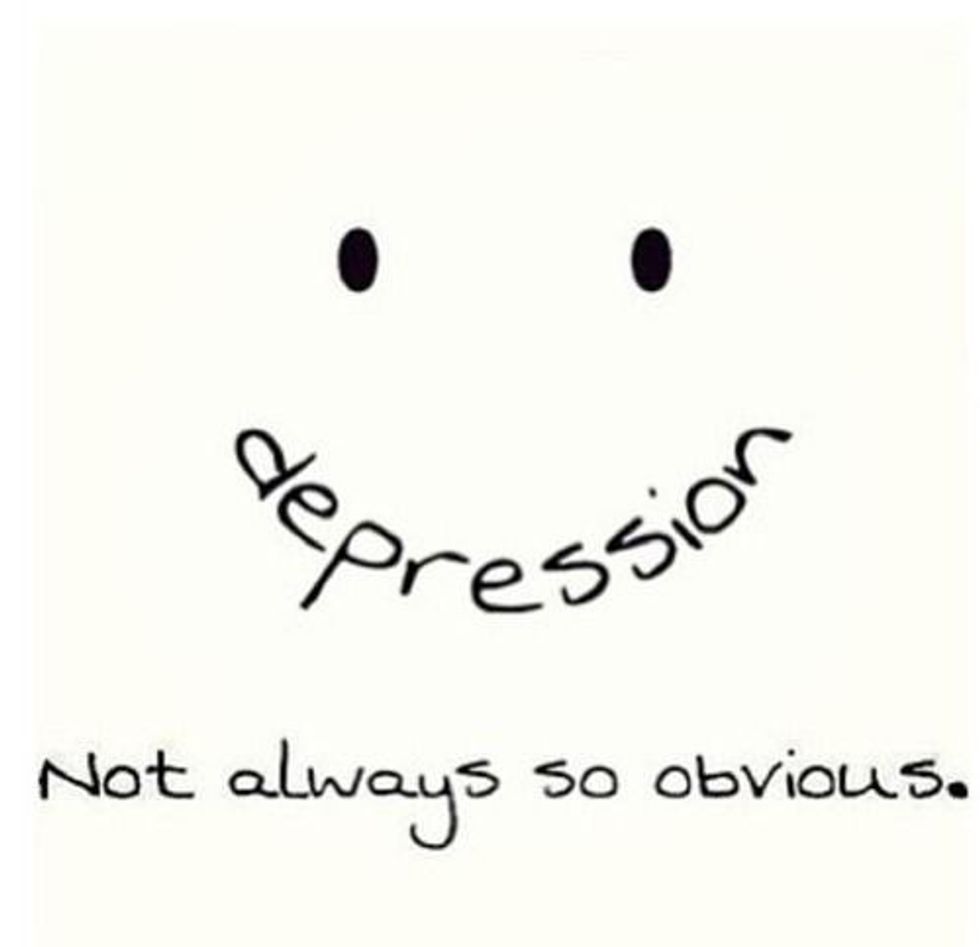According to WHO, the World Health Organization, 350 million people around the world are battling depression. More than likely, someone you care about has been diagnosed with depression and that means you have a choice to make. Are you going to support them by disabling the stigmas facing mental illness, or are you going to minimize the importance of their mental health by perpetuating stereotypes? Debilitating stereotypes have plagued those who deal with mental illness for hundreds of years, and while society's view of mental health is finally starting to change for the better, there are still so many people who don't understand the impact of their words have on someone who is trying their hardest to get better. Perpetuating these hurtful stereotypes not only perpetuates an ignorant mentality, but have a direct effect on the people around you. You never know who is suffering from a disease you can't see, which bring me to the first stigma we're going to address:
1. "Depression isn't a real disease."
I'm going to stop you right there. Yes. Yes, it is. Just like your lungs and your heart, your brain is an organ that can get sick and not function the way it's supposed to. Mental illness is nothing more than any other very treatable disease, but the way it is viewed in society is not always like that. Would you ever tell someone with cancer to 'just get over it' or that they're 'just not trying hard enough'? I didn't think so. The image above is a scan of two brains. One is depressed, the other is not. You can actually see how depression affects the brain.
Depression has major effects on three parts of the brain: the prefrontal cortex, the hippocampus, and the amygdala. The prefrontal cortex is the very front of your brain and is responsible for regulating emotions, making decisions, and forming memories. The prefrontal cortex has a tendency to shrink when exposed to too much cortisol, which brings us to the hippocampus. The hippocampus is the part of the brain that stores memories and regulate a hormone called cortisol, which is produced in times of stress. Over-production of this hormone can not only cause the prefrontal cortex to shrink, but can start to cause memory loss. Finally, the amygdala is the part of the brain that facilitates emotional responses such as happiness and fear, but overexposure to cortisol can cause it to become enlarged, disrupting sleep patterns and causing abnormal production of other hormones in the body. In short, depression is just as much a medical as heart disease or any other ailment, and needs proper treatment.
2. The same medication will work for everyone with depression.
"It worked for my friend, so why wouldn't it work for you?"
One of the key concepts to understand when learning about depression is that there are dozens of different kinds of treatment for it and they don't all work for everybody. Treatment for depression can range from anywhere between prescription medication and different forms of therapy. The kind of treatment someone uses does not mean anything negative or positive about their character or who they are as a human being; it just means that's what they need to get better. While sometimes only one form of treatment, more commonly it's a combination of treatments that will be most beneficial to the individual. The most important thing to remember is that every person is unique, and therefore, the help they receive will be unique.
3. Depression is a sign of weakness.
"It's all in your head, just get over it already."
This is probably one of the most infuriating stereotypes I've heard, so I'm going to put this bluntly: BEING DEPRESSED DOES NOT MEAN YOU ARE WEAK. YOU ARE STRONGER THAN YOU WILL EVER KNOW.
Depression is a mental illness that not only causes a constant feeling of sadness or hopelessness, but can cause you to lose all interest in doing things you once had a passion for. It makes you fatigued, so tired that the thought of getting up to make yourself a sandwich or just going to the grocery store feels like climbing Mount Everest. It messes with your sleep patterns and your eating habits, and this is all happening while you feel worthless and burdensome. Anyone who can deal with all of that, medication or no medication, is one of the strongest people you are ever going to meet because the daily tasks you find trivial can be insurmountable to them. But you will rarely see that because people fighting depression spend most of their time trying to pretend that they are okay.
4. Happy people can't be depressed.
"I had no idea... he was always smiling... I never expected he would..."
A smile does not necessarily equate to 'happy.' It could absolutely mean momentary happiness, but not "content-with-life, everything-is-sunshine-and-rainbows" happiness. More often than not, people with depression will hide their pain so as not to bum out their friends or be a burden to anyone. This comes from a feeling of hopelessness and worthlessness that will make the individual try to hide their inner turmoil out of fear of being a nuisance and a (usually inaccurate) mentality that no one really cares about them. Take the time to really talk to your loved ones about how they are and make sure they know just how important to you they are, and that you are there for them. Make your love apparent, because to someone suffering from depression, it isn't always obvious. Making it so can make a life-saving difference.
5. Talking about depression has to be, well, depressing.
"Isn't this kind of a downer to be talking about over dinner?"
Because of the stigma surrounding depression, many people affected by it do not want to open up about it to friends or family because they fear social isolation. This is rooted in the words 'crazy' and 'weird,' and how people use these words so casually when talking about mental illnesses. The main fear is that they will be isolated by their peers if they open up about their depression. People battling depression may even choose not to open up to a doctor or their employer about it for fear of being judged or fired. But it doesn't have to be this way! By beginning to talk about depression without complaining that it's a sad topic or feeling awkward you can not only learn more about someone and their struggle, but you can help them learn to open up to others about their depression! The best way to start a conversation about depression is to let them know that you are there for them no matter what and that they can trust you if they still don't want to talk, don't force them to. Just making yourself available and letting them know you care is sometimes all you need to do to make a difference.
6. Self- Stigma
"I feel like I bother people just by being alive."
"No one actually wants me here, I'm just a nuisance"
"They don't really care about how I feel."
Self-stigma is one of the most damaging stigmas people with depression have to fight. This is because self-stigma lives in their mind, which means it's pretty much impossible to escape from. It's the feeling of worthlessness combined with the negative phrases that surround depression (and other mental illnesses), becoming internalized from repetition throughout a person's life, whether it's directed at them or not. Essentially, it's when society says things over and over so much that you start to really believe it. This kind of negativity can have one of two effects on a person. It will either get them fired up and angry, causing them to want to fight against these prejudices by disproving them, or it will have debilitating effects on their self-esteem, making it ultimately harder for them to feel valued and want to get better. Of the two, obviously the first is the one to hope for -- as spite can be a powerful motivator -- but there is no guarantee how a person will react. In reality, instead of hoping that perpetuating stereotypes will make someone angry and want to prove them wrong, we just shouldn't use them. These stigmas are damaging enough to someone's recovery process without them starting to believe it themselves.
As human beings, it is our job to support and care for one another. You can choose to perpetuate stereotypes and hurt the people around you, or you can choose compassion and work to break down these terrible stigmas. If nothing else, I hope this article will inspire you to show someone that you love them and that they matter. Don't just tell someone you love them; show them by being there for them, hug them, let them know that their presence makes a difference to you. You might just save a life.
National Suicide Prevention Line: Available 24/7 at 1-800-273-TALK (8255).
Crisis Text Line: Free 24/7 support for anyone in need; just text START to 741741.
The Trevor Project: 24/7 confidential suicide hotline for LGBTQ+ youth at 1-866-488-7386.









 StableDiffusion
StableDiffusion StableDiffusion
StableDiffusion StableDiffusion
StableDiffusion Photo by
Photo by  Photo by
Photo by  Photo by
Photo by 
 Photo by
Photo by  Photo by
Photo by  Photo by
Photo by  Photo by
Photo by  Photo by
Photo by 












